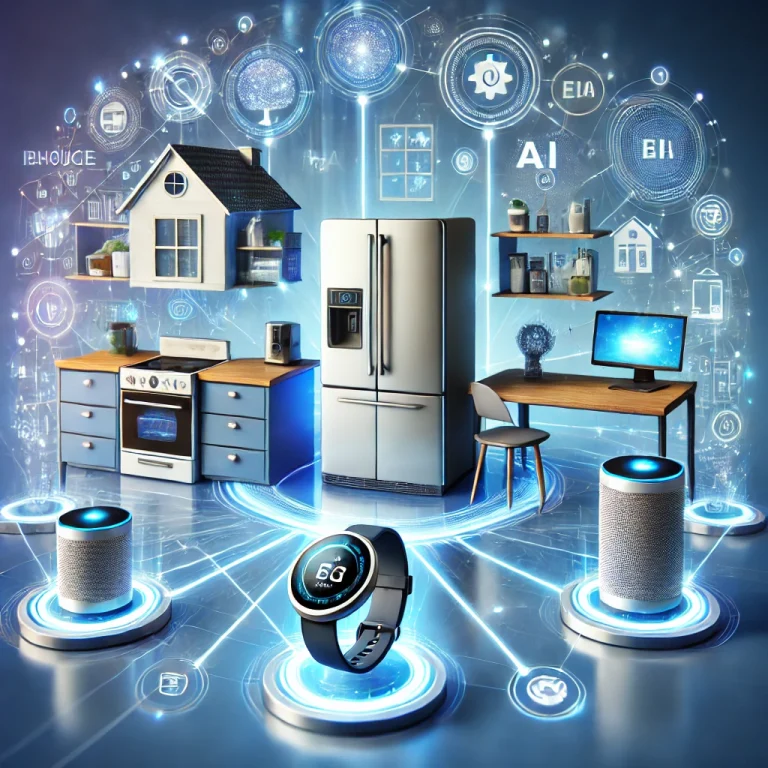Artificial Intelligence (AI) has moved from being a futuristic concept to a daily reality, shaping how we live, work, and interact with technology. From voice-activated assistants to wearables that predict health trends, AI is no longer confined to research labs or sci-fi movies—it’s in our pockets, on our wrists, and even running our homes.
But as AI becomes a standard feature in everyday devices, the question arises: What’s next?
AI in Home Electronics: Smarter Living Spaces
The rise of smart home devices has brought AI into our living rooms, kitchens, and bedrooms, making our spaces more connected and efficient.
- Voice Assistants
Devices like Amazon Echo and Google Nest are no longer just smart speakers. Their AI capabilities have expanded to managing routines, controlling smart devices, and even making proactive suggestions based on usage patterns. For example, Alexa can now remind you to reorder household essentials or adjust your thermostat based on the weather. - Smart Appliances
AI-driven refrigerators, ovens, and washing machines are taking household management to the next level. Modern refrigerators can suggest recipes based on their contents, while AI-enabled ovens can automatically adjust cooking times and temperatures for perfect results. - AI-Powered Security Systems
Smart cameras and doorbells equipped with AI can differentiate between a visitor, a delivery person, or an intruder. They can send alerts, record suspicious activity, and even respond to visitors via pre-recorded messages, ensuring safety with minimal user intervention.
AI in Wearables: A Personal Health Revolution
Wearables have gone beyond tracking steps and calories. AI is transforming these devices into powerful health and wellness tools.
- Health Monitoring
Smartwatches now come with AI algorithms that monitor heart rates, detect irregularities like atrial fibrillation, and even predict potential health risks. Companies like Apple and Fitbit are leading the charge in turning wearables into life-saving devices. - Mental Wellness
Wearables with AI features can track stress levels through heart rate variability and provide meditation or breathing exercises to help users relax. Future iterations may even predict and prevent mental health crises by analyzing behavioral patterns. - Fitness Optimization
AI in wearables personalizes fitness routines by analyzing user data over time. Devices can suggest workout plans, monitor progress, and provide real-time feedback to optimize performance.
What’s Next for AI in Everyday Devices?
The possibilities for AI integration are vast, but here are a few exciting trends on the horizon:
- Predictive Personalization
Devices will learn your habits so well that they’ll anticipate your needs before you express them. For instance, your smart home might automatically dim the lights and play calming music as it detects you winding down for the night. - Seamless Ecosystems
AI will enable devices to communicate and work together more effectively. Imagine your smartwatch detecting elevated stress levels and notifying your smart speaker to suggest a guided meditation while your thermostat adjusts to a cooler temperature for relaxation. - AI-Driven Wearables for Chronic Conditions
Wearables will go beyond monitoring to actively managing chronic conditions like diabetes or hypertension. AI can alert users to potential complications and even communicate directly with healthcare providers. - Smarter Energy Management
AI in home electronics will further reduce energy consumption. For example, smart grids could use AI to optimize power usage based on real-time demand and renewable energy availability.
The Ethical Dilemma: Balancing Convenience and Privacy
While AI enhances our lives, it raises concerns about data security and privacy. The more our devices learn about us, the greater the potential for misuse. As AI becomes more pervasive, tech companies must prioritize transparency and ethical practices to ensure user trust.
The Bottom Line
AI is no longer just an add-on—it’s becoming the foundation of modern technology. Its integration into everyday devices has made our lives more convenient, efficient, and personalized. But as we embrace these advancements, it’s crucial to navigate the challenges responsibly.
The rise of AI in home electronics and wearables is just the beginning. As innovation continues, our everyday devices will become even smarter, shaping a future where technology feels less like a tool and more like a trusted companion.
Are you ready to explore the possibilities of AI in your daily life? Stay tuned for the latest trends, reviews, and updates from Supreme Broadband—your connection to the future.

